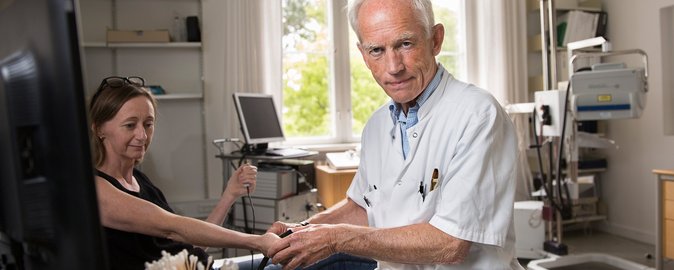- Education
-
Research
Current research
Talent
-
Collaboration
Businesses
Government agencies and institutions
Alumni
-
About AU
Organisation
Job at AU
A new research centre at Aarhus University and Aarhus University Hospital opens today. The centre aims to find out why half of all diabetics develop what is know as neuritis, an inflammation of the nerves.
2015.05.22 |

Troels Staehelin Jensen is in charge of the IDNC project, an interdisciplinary research project involving Danish, British and American researchers. Photo: Lars Kruse, Aarhus University.
In Denmark, 320,000 people suffer from the disease, while a further 30,000 new patients are annually diagnosed with diabetes. Up to half of all diabetics are affected by neuritis. In the worst cases, the disease can lead to amputation. A new centre, the International Diabetic Neuropathy Consortium (INDC) at Aarhus University and Aarhus University Hospital, will find out how to prevent neuritis caused by diabetes, which is also known as diabetic neuropathy. The centre will be run from Denmark.
"Diabetic neuropathy is painful for the individual patient, and it affects far too many patients. It is an insidious disease which in many cases is only discovered once far too much damage has already been done. There are major individual human and macroeconomic perspectives in helping this group of patients," says Professor Troels Staehelin from Aarhus University and Aarhus University Hospital.
He is heading the IDNC project, an interdisciplinary research project involving Danish, British and American researchers. They will investigate the causes of neuritis and hope to find new ways to treat and prevent the development of the complication.
The Novo Nordisk Foundation has made a grant of DKK 60 million to the research collaboration.
"We are grateful to the Novo Nordisk Foundation for this large donation and we are also pleased on behalf of the many diabetic patients who struggle daily with the consequences of diabetic neuritis. Research into the causes and treatment of the disease has not previously had such intense research focus as the grant now makes possible," says Dean Allan Flyvbjerg from Health, Aarhus University.
The number of patients with type 2 diabetes is increasing rapidly in our part of the world and also in developing countries. This means that incidences of diabetic neuropathy are also increasing.
Symptoms include a feeling of walking on broken glass, foot pain, cuts on the feet that refuse to heal and difficulty walking. The disease is therefore one of the primary causes of diabetes-related hospital admissions and amputations.
“In the project we will combine data from relevant patient registers with samples from more than 6,000 Danish diabetic patients to learn more about why the disease occurs and who develops it," says Troels Staehelin Jensen.
By combining knowledge from clinical studies, basic research and registry studies, the researchers hope that it be easier will in future to assess the individual patient's risk of developing neuritis and that treatment of the disease will become more effective.
The centre was officially opened today at an opening ceremony at Aarhus University Hospital.
Professor Troels Staehelin Jensen
Aarhus University, Department of Clinical Medicine, Danish Pain Research Centre and
Aarhus University Hospital
Telephone: +45 2616 7042
tsjensen@ki.au.dk